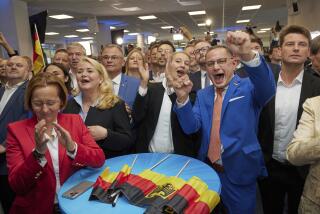Uniters, Fretters, Fence-Sitters and the Euro-Skeptics
- Share via
If Washington has been whittling away at the powers of the federal government, Europe these days is doing the opposite: For the last half a century, the continent has been building an increasingly powerful political center, anchored around a common currency. But today’s hotly contested constitutional referendum in France could land the growing EU family in long-term therapy. A year after adopting 10 new siblings, politicians and voters are squabbling about whether a constitution is what they need to keep this dysfunctional family’s bonds from fraying.
*
For the record:
12:00 a.m. June 19, 2005 For The Record
Los Angeles Times Sunday June 19, 2005 Home Edition Opinion Part M Page 2 Editorial Pages Desk 0 inches; 26 words Type of Material: Correction
Europe’s future -- A map in the May 29 Opinion section suggested that Northern Ireland is a part of Ireland. It is a part of Britain.
-- Allison Hoffman
Uniters:
Leaders in Germany, which has long viewed the European union as a kind of historical absolution, and the newly minted member countries of the old Eastern Bloc view constitutional ratification as a means of reaffirming their faith in the political worth of a united Europe. The German public’s enthusiasm for Europe -- and for its pro-Europe leader, Gerhard Schroeder -- has cooled with the economy, but the national assembly approved the constitution this month in a vote timed partly to boost the French “yes” lobby.
Other uniters: Austria, Belgium, Greece, Hungary, Italy, Latvia, Lithuania, Slovakia, Slovenia, Spain.
Fretters:
Concern about the effect of the new constitutional rules on smaller countries has dampened popular support in some unlikely quarters, particularly among EU-friendly new members such as Poland. The Polish economy has benefited from EU membership, and the constitution has wide popular support. But many Poles are concerned the new voting rules for the policy-setting European Council will reduce their country’s influence, tilting power back to the larger countries to their west; others in the heavily Catholic country harbor lingering resentment that the constitution’s preamble doesn’t contain any explicit reference to the continent’s Christian history. Other fretters: Cyprus, Estonia, Finland, Malta, Portugal.
Fence-sitters:
France and the Netherlands are the EU’s wild cards. Polls have consistently put the French “no” side ahead in the final run-up to today’s referendum, despite the country’s key role as an EU founding member. Its restive electorate appears eager to give a bloody nose to politicians they blame for a sluggish economy, and to reassert French primacy in the expanded union. In the nearby Netherlands, a public frustrated by a stagnant economy and the difficulty of integrating recent Muslim immigrants is on track to roundly reject the constitution in a vote Wednesday. Other fence-sitters: The Czech Republic, Denmark, Ireland and Luxembourg may be swayed by this week’s votes.
Euro-skeptics:
Both Britain and Sweden have long been wary of efforts to delegate political authority away from national governments to European institutions in Brussels. Both countries opted out of the euro, the Swedes in a decisive 2003 referendum. British Prime Minister Tony Blair, fresh from his bruising victory in this month’s election, promised a constitutional referendum next spring and found himself promptly besieged by calls to preserve EU kickbacks to the British budget. Some conservatives, who successfully opposed joining the euro, have pounced on the constitutional question to ask whether Britain ought to remain in the EU at all.
More to Read
Sign up for Essential California
The most important California stories and recommendations in your inbox every morning.
You may occasionally receive promotional content from the Los Angeles Times.













